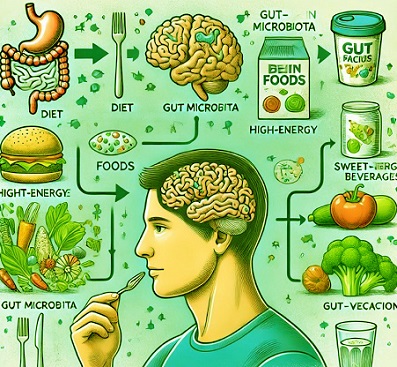Nikhil Prasad Fact checked by:Thailand Medical News Team Jul 10, 2024 1 year, 7 months, 3 days, 22 hours, 18 minutes ago
Mental Health News: Researchers from the Netherlands have uncovered fascinating insights into the connection between diet, gut microbiota, ADHD, and reactive aggression. Their exploratory analysis reveals how what we eat might significantly influence our behavior and mental health. This
Mental Health News report delves into the details of this study, highlighting the intricate relationships between diet, gut bacteria, and behavior, making it easier for the general public to understand the significance of these findings.
 The impact of diet on ADHD and Reactive Aggression
The impact of diet on ADHD and Reactive Aggression
Image: AI Generated By TMN
Understanding ADHD and Reactive Aggression
Attention-Deficit/Hyperactivity Disorder (ADHD) is a prevalent neurodevelopmental condition characterized by symptoms of inattention, hyperactivity, and impulsivity. It's not just a childhood disorder; many adults continue to experience these symptoms, often accompanied by emotional regulation issues like reactive aggression. Reactive aggression refers to aggressive responses triggered by perceived threats or frustrations. This aggressive behavior can severely impact social interactions, work, and overall quality of life. Understanding the underlying factors contributing to these behaviors is crucial for developing effective interventions.
The Study and Its Goals
The study aimed to explore how diet and gut microbiota relate to ADHD and reactive aggression in adults. The researchers from Radboud University Nijmegen Medical Center and Erasmus MC, among other institutions, investigated the dietary patterns and gut microbiome composition of 77 adults with ADHD and 76 neurotypical individuals. By examining the relationships between diet, gut bacteria, and behavior, the researchers hoped to uncover potential pathways for therapeutic interventions.
Key Findings: Diet and Reactive Aggression
The study identified three primary dietary patterns:
-High-Alcohol Diet: Characterized by high consumption of alcohol and meat, with low intake of sweetened beverages and chocolate.
-High-Energy Diet: Involving high consumption of sweetened beverages, meat, and dairy, but low intake of vegetables.
-High-Fiber Diet: Marked by high consumption of legumes, fruits, and vegetables, with low intake of meat, milk, and chocolate.
Among these, the high-energy diet stood out. It was significantly associated with higher reactive aggression scores. This suggests that diets rich in sweetened beverages, meat, and dairy but low in vegetables might exacerbate aggressive behaviors. The researchers noted that individuals with higher reactive aggression tended to consume more high-energy foods, highlighting a potential link between diet and aggressive behavior.
Gut Microbiota: The Invisible Influencers
The gut microbiome, consisting of trillions of bacteria in our intestines, plays a crucial r
ole in our health. The researchers found significant differences in the gut microbiota of individuals with ADHD compared to neurotypical individuals. However, no overlap was found between the genera associated with reactive aggression and those linked to ADHD.
Some specific genera stood out:
Lactobacillus and Slackia were associated with higher reactive aggression.
Eubacterium xylanophilum group was associated with lower aggression but did not remain significant after accounting for ADHD diagnosis.
These findings highlight the potential role of gut bacteria in influencing behaviors related to aggression and ADHD. The gut-brain axis, a bidirectional communication pathway between the gut and the brain, might play a pivotal role in these associations. Alterations in gut bacteria could impact brain function and behavior, contributing to symptoms of ADHD and reactive aggression.
No Mediation Effect Found
The researchers also explored whether gut microbiota could mediate the relationship between diet and reactive aggression. Although two genera, Eubacterium nodatum group and Lachnospiraceae UCG 010, were identified as potential mediators, the study found no significant mediation effect. This suggests that while diet and gut bacteria both influence behavior, their relationship might be more complex than direct mediation.
Implications for Mental Health and Treatment
The study underscores the importance of considering diet in managing ADHD and aggressive behaviors. Interventions that reduce the intake of high-energy foods and increase the consumption of vegetables and other high-fiber foods could be beneficial. Additionally, targeting the gut microbiome through probiotics or other means might offer new avenues for treatment. Dietary interventions could serve as a complementary approach to traditional treatments, providing holistic strategies for managing ADHD and associated behaviors.
Looking Forward
The findings open up exciting possibilities for further research. Large-scale studies and clinical trials are needed to confirm these results and explore the mechanisms behind the diet-microbiota-behavior relationship. Understanding these connections better could lead to innovative strategies for managing ADHD and reactive aggression.
By examining the complex interplay between diet, gut microbiota, and behavior, researchers aim to develop targeted interventions that could significantly improve mental health outcomes. The potential for dietary modifications and probiotics to serve as adjunct treatments offers a promising avenue for future research and clinical practice.
The study findings were published in the peer-reviewed journal: Nutrients.
https://www.mdpi.com/2072-6643/16/14/2174
For the latest
Mental Health News, keep on logging to Thailand Medical News.
Read Also:
https://www.thailandmedical.news/news/exponential-rise-of-children-with-adhd-alarms-swedish-government
https://www.thailandmedical.news/news/study-finds-that-one-in-nine-american-children-are-diagnosed-with-adhd
